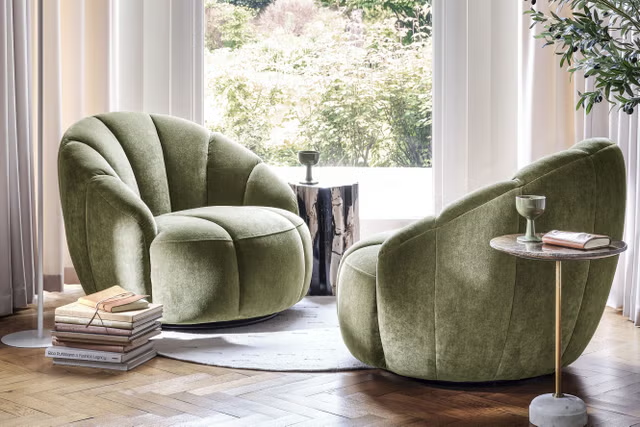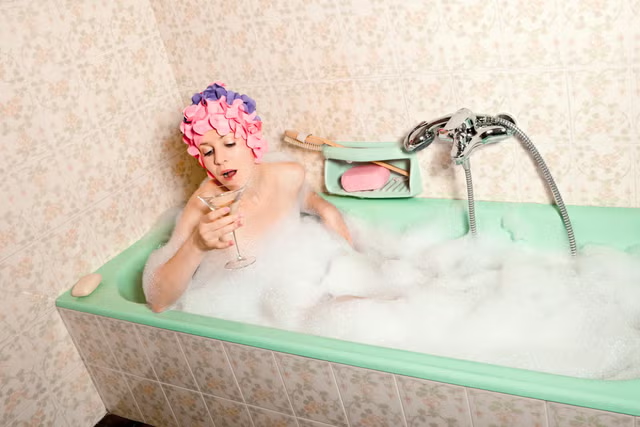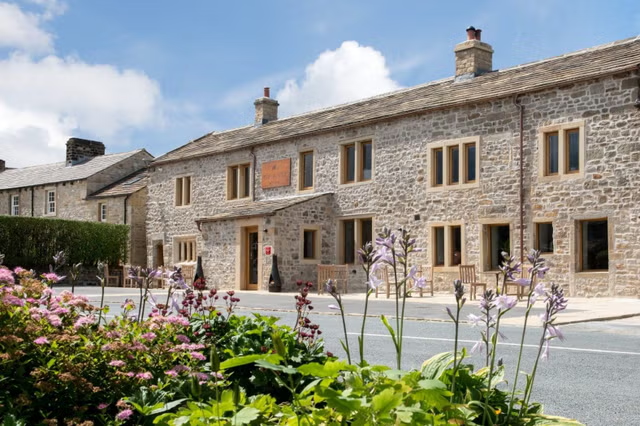An explosion of summer roses and frothy clouds of cow parsley, all snowy white, punctuated by topiaried trees, greet me at the entrance to Chrissie Rucker’s 17th-century Buckinghamshire home. The scene is so picturebook perfect that I could almost have wandered into the pages of Alice’s Adventures in Wonderland. But there is little chance that the queen who resides here will charge outside with a bucket of crimson paint to daub the flowerheads red.
For this is the house belonging to the founder of The White Company, purveyor of very nice pillowcases, mattress toppers and all things tastefully neutral.
I’ve arrived slightly early on a working-from-home Friday, and Rucker is still finishing her Pilates class, so I take a perch on one of the 10 Hans Wegner Wishbone chairs arranged around a very long kitchen dining table. There’s a cinnamony aroma of baking chickpeas emanating from the oven; Nikki, the family’s former family nanny turned Life PA, is presiding over the Aga (white, of course).
Rucker’s husband, Nick Wheeler, the dynamo behind shirt retailer Charles Tyrwhitt, is not about, but I do see a bronze bust of his likeness, surrounded by portraits of the family pets. I also spot a framed print on the wall bearing the legend: ‘It’s Time To Drink Champagne and Dance on Tables’.
Well, it’s an apt sentiment…The White Company, now in its 30th-anniversary year, is enjoying ruddy good health in a distinctly soggy climate for the high street.
With 73 shops in the UK and Ireland, plus another due to open in Hampstead (there’s also a shop-in-shop in Bloomingdale’s Home in the Dubai Mall), in May the company announced an increase in turnover of four per cent to £289.3 million (in the year up to 29 July 2023). I might also mention that sales at Charles Tyrwhitt are going gangbusters.

In the same period, it reported a leap in sales of 45 per cent to £269 million, thanks in part to a post-pandemic demand for casual work attire. The White Company is owned by Rucker and Wheeler’’s company Bectin Limited; the pair made headlines last year when they paid themselves £50 million in dividends as sales bounced back after lockdown.
Pilates completed, Rucker, 55, emerges dressed in a plain white T-shirt, black Sweaty Betty leggings and spotless black trainers. Softly spoken, with a fluttery, rather Princess Diana-esque gaze, she is an attentive host, ushering me from the main residence along a seemingly endless brick herringbone path to the sleek, steel-framed modernist pool house she and Wheeler built on a chunk of former ‘derelict’ kitchen garden, now also featuring a tennis court, pool and pristine lawns.
The pool house is all sun-bleached timber cladding on the outside and expensive polished concrete surfaces on the inside (as advised by Rose Uniacke, the celebrity-favourite interior decorator, who often works with Rucker on her homes).
‘This is the place we live the most and use the most,’ Rucker says. There’s a sleek, geometric firepit in the heart of the space and I’m certain I spy an elegant matching hot tub around the pool’s edge. She keeps a study in the main house (she and Wheeler no longer share a home office), but admits that on summer days ‘this is always a really special place to be in… sometimes I just bring my laptop and I’ll sit and work’. As Mum Sheds go, it’s pretty superior.
The story of Rucker’s entrepreneurial journey from ‘painfully shy’ horse-mad child in Kent to successful founder of a high-street powerhouse brand was never preordained. Her parents – commodity broker Patrick and Rosemary, a horse breeder – divorced when she was seven.
‘I didn’t thrive at school, I was dyslexic, really not academic... The girl who left school at 16 with six O levels, with only an A in RE and cookery, was not [an obvious candidate] to run a business,’ she tells me. ‘My mum always used to joke that I was qualified to be a cooking nun.’
Her ‘lightbulb moment’ for starting The White Company could be a scene from a 1990s romcom: Rucker, who had been dating Old Etonian Wheeler for four years (he founded his shirt venture aged just 21), was keen to demonstrate that she could be ‘excellent wife material’, so she offered to decorate the home he had just purchased.
‘His linen was burgundy, and when you opened the kitchen cupboards, there were just a few plates and four chipped mugs,’ she recalls. ‘I was very overwhelmed.’ After being snubbed in a ‘very famous’ department store, where she was pointed in the direction of the cheap linens, she was determined to teach that snooty sales assistant – and the whole dreary world of British bed sheets – a lesson, by starting a business that offered beautifully simple, high-quality white linens directly to customers, via mail order. Her venture was funded by a £6,000 inheritance left by her grandmother.
Not everyone thought it was a wonderful idea. ‘I remember lots of friends saying to me, “You’re mad. Why does anybody want all these white things?”’ Interestingly, Wheeler did get it: ‘Nick gave me the confidence to start – he was the person saying, “You can do this, it’s a great idea, go for it.”’

Prior to her epiphany in the linen department, Rucker had spent a few years working in glossy magazines – starting as a receptionist at Condé Nast (‘I probably almost got fired for chatting too much to Duran Duran, who seemed to visit regularly’), before working her way up the editorial food chain, first as a fashion assistant at GQ, then on to Brides, House & Garden and Vogue (‘working for the amazing Anna Harvey, who I learned so much from’). The redoubtable Tina Gaudoin, then health and beauty editor at Harper’s & Queen, left a strong impression on Rucker: ‘She taught me to be brave and to push myself outside of my comfort zone.’
Gaudoin, now a writer and business coach, remembers Rucker’s sharp instincts from the off. ‘Chrissie was a killer assistant because she could always anticipate what I needed before I knew it myself, and I think that’s the key to her success. [With The White Company] she started with a really simple concept that people didn’t know they needed till they saw it, and she’s been able to build on that simplicity – but all the while adhering to her initial tenets, which were excellent quality, simple styling, ease and comfort.’
From a 12-page mail-order catalogue to the multi-category behemoth it is today (not just linens, but kitchen and dining ware, clothing, beauty, childrenswear and furniture), it is testament to The White Company’s foundational idea and its seductive promise to make your world a little bit calmer, cosier and tonally serene that it’s hard to imagine middle-class British life without it.
The brand sold one million candles last year and 90,000 pairs of 100 per cent cashmere socks. Back in 1994, a lot of British homes were still a hodge-podge of jazzy Axminsters and questionable wallpaper. Scandi minimalism had yet to reach Middle England. And who in 1994 even owned a pair of cashmere socks? Well, not me.
Not only did Rucker anticipate trends like ‘hygge’ – and execute them in a reassuringly British way – she has stuck to her aesthetic. She attributes some of this ability to articulate a vision to experience in glossy publishing (‘I think I was a frustrated art director’). One of her earliest insights was that ‘white in the home is like the perfect little black dress. It’s simple yet effortlessly stylish, modern, yet classic. It also has a magical, calming, spa-like quality…’

I’m curious to know if she has ever felt the pressure to change it up over the years – to embrace, say, shabby-chic florals or millennial pink? ‘You know, whoever you are, whatever your taste is, whether you love pattern or print, there really is a place in everyone’s home for some white,’ she says.
As the brand turns 30, Rucker is not especially interested in self-congratulation, although she is proud that the business has recently earned B Corp status, a marker of social and environmental impact (‘we’re on a very determined journey making sure that sustainability is where it should be’).
She’s more interested in future growth – potentially expanding into fresh territories and product categories. The business has a new CEO: Paula Nickolds (ex-Sainsbury’s and former managing director of John Lewis, 2017-2020, who will succeed Mary Homer, now stepping down from the role). ‘It’s a really, really exciting time… fresh energy is just a wonderful thing, it breathes life into everything all over again,’ enthuses Rucker.
No doubt Nickolds will be tasked with growing online sales – which were not as perky as bricks and mortar performance in recent results – as well as sorting out the fulfilment snafus that have beset the business this year, as it transitions to a new distribution centre. (It was forced to apologise to customers for delays in March.) Rucker tackles this head-on: ‘I am very sorry to any customers suffering from our warehouse move at the moment,’ she says. ‘But in order to keep growing the business, you have to have that foundation in place.’
Over the years, Rucker has learned to be sanguine about bumps in the road (admitting to ‘running out of cash flow in the early days’), but that doesn’t mean she is immune to stress. On a personal level, she says the juggling act of entrepreneurial business life and parenting four children – Tom, 27, Ella, 26, India, 24, and Bea, 20 – has brought its challenges: ‘It’s a rollercoaster.’

She runs her life on a spreadsheet: ‘Six columns – one for me, one for Nick, and one for each of the four children… It’s all about taking a good hard look at yourself and saying, “Well, where do I add value or not? That’s where building the right team around you with experts in their fields is just vital.”’
Even so, there have been overwhelming moments: ‘There was definitely a point when the children were quite little. I remember just feeling like I was doing everything badly… I said to the children, “I think I’m going to sell the business,” and they said, “No, no, no, no, please, please don’t stay at home.” They were very sweet. They said, “No, we are really proud of what you do, please don’t stop.”’
We break for lunch around the swimming pool, and Wheeler joins – not in his Charles Tyrwhitt casual Friday workwear, but what looks like his tennis garb. It’s a particularly hot afternoon, but despite the tempting allure of the turquoise rectangle of pristine water in front of us, he admits he hasn’t taken a dip this year. Nor last year, now he comes to think of it. ‘Well, the pool cover was broken for a long time,’ Rucker reminds him gently.
Later, I ask Rucker what it is like to be married to another super-high-achieving entrepreneur. ‘Rather wonderful,’ she says, ‘because we both really understand each other’s lives… because we understand each other’s businesses a little, it’s a fantastic thing to be able to talk things through with your husband when you need to.’
Rucker is so charming and authoritative in person that I wonder if she has ever considered making herself the face of the brand, like a Martha Stewart, say, or Gwyneth Paltrow? ‘Yeeeeeees,’ comes the reply, with a sort of polite, drawn-out exasperation, which I interpret to mean: ‘Yes, it has been suggested. But noooo… it’s never going to happen.’ ‘I’m totally passionate about the business, but I’m also quite private.’
As The White Company transitions into its fourth decade, this period also marks a life-stage shift for Rucker and Wheeler, with their four children now all in their 20s: ‘I have no teenagers suddenly, and they are all working.’

In fact, youngest child Bea has a promising career as a pop star, going by the name of Bea and Her Business (her biggest track, Born To Be Alive, has over 29 million plays on Spotify). Two of the brood still live at home in the family’s London house in Holland Park, while the other two are independent. ‘We try and have family supper on a Monday night once a month, so we can get everyone together.’
Whether with friends (fellow well-heeled retailers Claire Hornby of Me & Em and Anya Hindmarch are part of her social circle) or family, Rucker is an avid host. ‘We entertain in a very relaxed fashion. I will always go for quite simple food – a ham and cheese and a big salad – so that it doesn’t become a great big stressful thing to organise. This was very much my mum’s mantra actually, she just loved filling the house with people, having friends and family around… It doesn’t matter if it’s just shepherd’s pie and salad, it’s just nice to bring people together.’
I ask her if her friends ever feel intimidated to invite her over, given the photogenically perfect appearance of her home? ‘I hope not. I mean I’m the first one to clear the table and, you know, serve the drinks and muck in to help. I think they know me well enough not to,’ she replies, sounding rather crestfallen at the suggestion. ‘Nick and I both grew up in the country. I grew up in muddy fields and stables…We’ve always had a scruffy side of life.
Then we’ll have a side of life where we tidy up and dress up a bit. I can tell you it’s not perfect all the time, by a long shot.’ I ask her to confess to her least White Company foible. ‘Probably that I let my Jack Russell sleep on the bed…’
Monday and Friday are Rucker’s ‘desk days’ working from home – often in Buckinghamshire: ‘That’s when I catch up on my emails and try to empty my inbox. And then Tuesday, Wednesday, Thursday are literally solid meetings in the office.’ (The White Company HQ can be found in London’s Television Centre in – you guessed it – White City.)

She deals with the pressure of this full-on existence by investing seriously in her own wellness. ‘Well, I think for us girls, the first thing to get on top of is our hormones, and I love my hormone doctor, Paul Jenkins [the Harley Street endocrinologist]. I can’t recommend him enough,’ says Rucker.
After a few injuries (‘ankle operation, shoulder operation and a difficult disc in my neck’), she sees a cranial chiropractor and is diligent about exercise: light weight training, Pilates, gym sessions three times a week, and walking as much as she can.
Walking is a newly discovered shared passion for her and Wheeler; on holiday (they were in India for three weeks at New Year, South Africa is next on the list) they wake up early to walk for an hour and a half in the morning. She also describes herself as a ‘sleep evangelist’, having suffered a period of insomnia a few years ago. ‘If I go on my phone for even 30 seconds on Instagram before bed, I won’t sleep well.’
I am curious about what’s in her wardrobe, other than The White Company – and it’s as minimally tasteful as you’d expect. ‘What have I bought recently? I mean, I love Chloé… I like simple brands with a boho twist. Prada, for beautifully tailored coats and great boots… And The Row. I can’t afford much actually, but I love the aesthetic.’
Does she ever switch it up on the colour front? She thinks for a moment. ‘A friend of ours had a pink party, which really sent me, I almost started to hyperventilate. In the end, I wore all black and a fluorescent pink hat. Actually it was the most popular hat at the party. All the children were nicking it. It ended up in the swimming pool.’
With grown-up kids, the columns on Rucker’s personal spreadsheet may be looking slightly different, but she remains incredibly busy by anyone’s standard. She is a Gold Patron of the Prince’s Trust and a particular advocate for disadvantaged girls (she’s a Founding Gold Patron of the trust’s Women Supporting Women programme).
‘We want all young women to have the support and the tools they need to find their confidence, as well as the inspiration for them to move forward. And that’s moving forward into a job, or further training to become self-employed… that’s the critical bit.’

Steering the business into its next stage of growth clearly remains an intense focus: ‘I feel like we’re on the brink of a new era for The White Company. I suspect we will be aiming to double the size of the business.
“I can’t give you the exact number, but probably in the next 10 years… which will mean expansion in new territories in the world, and new territories in product. I’m still as passionate about it today as I was at the beginning.’
Rucker might sound coy at times, but her old boss Tina Gaudoin, who remembers a phone conversation about 30 years ago, is not surprised at her ‘global domination’. ‘She said, “I’m going to do something that is all about white bedding, I don’t want to be a beauty assistant any longer.”
I remember saying to my then husband that night, “Oh, Chrissie called today and she’s got an idea for a white company. I think it’s cute, but I don’t know how far she’s going to be able to extend it…” Ahem.’
Disclaimer: The copyright of this article belongs to the original author. Reposting this article is solely for the purpose of information dissemination and does not constitute any investment advice. If there is any infringement, please contact us immediately. We will make corrections or deletions as necessary. Thank you.


